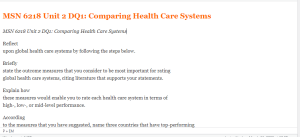MSN 6218 Unit 2 DQ1: Comparing Health Care Systems
MSN 6218 Unit 2 DQ1 Comparing Health Care Systems
Reflect
upon global health care systems by following the steps below.
Briefly
state the outcome measures that you consider to be most important for rating
global health care systems, citing literature that supports your statements.
Explain how
these measures would enable you to rate each health care system in terms of
high-, low-, or mid-level performance.
According
to the measures that you have suggested, name three countries that have top-performing
health care systems.
What are
the common themes among these top-performing health care systems, with regard
to outcomes?
According
to the measures that you have suggested, name three countries that have
low-performing health care systems.
What do top
performers do or have that is different from low performers?
According
to the measures that you have suggested, name three countries that have
mid-range performing health care systems.

What do top
performers do or have that is different from mid-range performers?
Based on
your findings, what three changes would you suggest for the United States
health care system for it to become a high-performing system?
Note:
Remember to adhere to the requirements listed in the Faculty Expectations
Message for unit discussion posts and peer responses.
Click here to ORDER an A++ paper from our MASTERS and DOCTORATE WRITERS: MSN 6218 Unit 2 DQ1: Comparing Health Care Systems
Response
Guidelines
In
responding to a colleague’s post, focus on the three changes that your
colleague has suggested for the United States health care system. For each suggested
change, locate and cite:
Evidence
that supports the suggested change.
Evidence
that calls the suggested change into question.
Learning
Components
This
activity will help you achieve the following learning components:
Identify
applicable outcome measures.
Identify
non-U.S. health care systems that afford an opportunity for useful comparison
with the United States.
Recognize
the components of a health care system and the contributing factors that
produce the best possible outcomes.
Recognize
the salient similarities and differences among various health care systems.
Determine
the feasibility of making specific changes to a health care system or program.
Determine
the potential short- and long-term effects of a proposed change to a health
care system or program.
Identify
appropriate community health benchmarks or goals.
Determine
how lessons learned from other health care systems can be applied to domestic
systems to improve outcomes.
Resources
MSN 6218 Unit 2 DQ1 Comparing Health Care Systems Grading Rubric Guidelines
| Performance Category | 10 | 9 | 8 | 4 | 0 |
| Scholarliness
Demonstrates achievement of scholarly inquiry for professional and academic decisions. |
|
|
|
|
|
| Performance Category | 10 | 9 | 8 | 4 | 0 |
| Application of Course Knowledge –
Demonstrate the ability to analyze, synthesize, and/or apply principles and concepts learned in the course lesson and outside readings and relate them to real-life professional situations |
|
|
|
|
|
| Performance Category | 5 | 4 | 3 | 2 | 0 |
| Interactive Dialogue
Replies to each graded thread topic posted by the course instructor, by Wednesday, 11:59 p.m. MT, of each week, and posts a minimum of two times in each graded thread, on separate days. (5 points possible per graded thread) |
|
Summarizes what was learned from the lesson, readings, and other student posts for the week. |
|
|
|
| Minus 1 Point | Minus 2 Point | Minus 3 Point | Minus 4 Point | Minus 5 Point | |
| Grammar, Syntax, APA
Note: if there are only a few errors in these criteria, please note this for the student in as an area for improvement. If the student does not make the needed corrections in upcoming weeks, then points should be deducted. Points deducted for improper grammar, syntax and APA style of writing. The source of information is the APA Manual 6th Edition |
|
|
|
|
|
| 0 points lost | -5 points lost | ||||
| Total Participation Requirements
per discussion thread |
The student answers the threaded discussion question or topic on one day and posts a second response on another day. | The student does not meet the minimum requirement of two postings on two different days | |||
| Early Participation Requirement
per discussion thread |
The student must provide a substantive answer to the graded discussion question(s) or topic(s), posted by the course instructor (not a response to a peer), by Wednesday, 11:59 p.m. MT of each week. | The student does not meet the requirement of a substantive response to the stated question or topic by Wednesday at 11:59 pm MT. |

